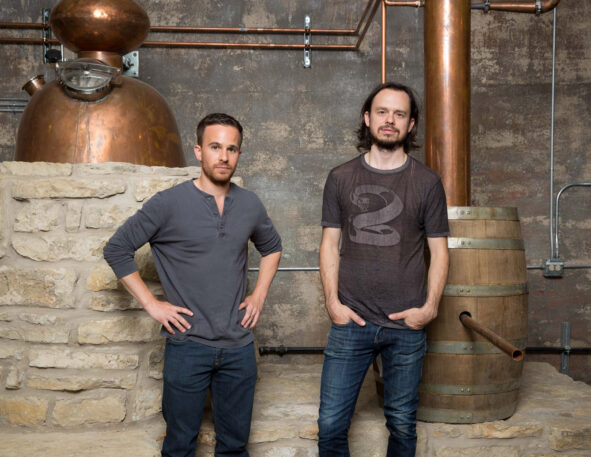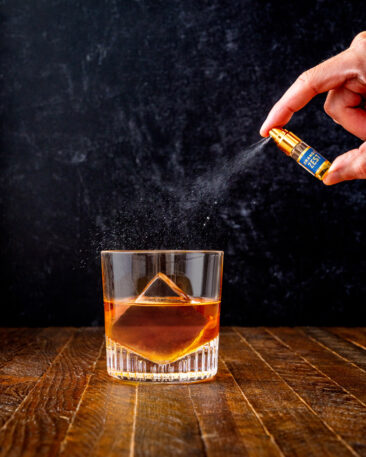Don’t be surprised when the shelves of your local liquor store are overrun by ready-to-drink cocktails (RTD). Sales increased 226% from 2016 to 2021, making RTD one of the fastest-growing segments in the alcoholic beverages industry. And with a predicted compound annual growth rate of 9% between 2023 and 2028, the party may just be getting started.
It’s easy to score mass-produced single-serve cans of RTD destined for tailgate coolers, as well as a growing number of classics that lean toward big brand distilleries. What’s harder to find are ultra-premium cocktails, those created with higher-quality spirits, often from independent distilleries, along with other artisanal-made ingredients and localized botanicals, creating a complex, premixed option—like what you get in a craft cocktail lounge.
That’s the sliver of the RTD business fellow Chicagoans and cofounders Robert Haynes and Jordan Tepper are exploring with Sunday’s Finest Gold Fashioned, their interpretation of the Old Fashioned, ringing in at $150.00 for a 750ml bottle (about 10 to 12 cocktails). “While a designation like ultra-premium may be the technical category, we simply try to make the best possible version of a cocktail and then price it accordingly,” says Tepper, a former investment banker and consultant who focused on the beverage alcohol space.
The RTD image shift from novelty to mainstream began during COVID with the widespread availability of buying premade cocktails to-go, from even the fanciest restaurants. At the height of the pandemic, when restaurants were largely closed to on-premise dining, 39 states allowed this short-term solution to boost sales of takeout orders. In the summer of 2020, Iowa became the first state to permanently legalize cocktails to-go, and since then 21 other states and the District of Columbia have done the same, one of the biggest changes to American liquor laws since the repeal of Prohibition in 1933.

Haynes and Tepper had launched their boutique distillery Apologue Liqueurs in 2017 to focus on adventurously flavored spirits like saffron, celery, and persimmon, used in leading bars and restaurants as cocktail modifiers—the tertiary ingredients that add flavor and personality to base spirits. They wanted to use “alcohol to extract the things that are beautiful and natural about real fruit, roots, herbs, and barks via a traditional process,” says Haynes, whose long spirits-and-hospitality career includes opening crew for James Beard Award winner The Violet Hour, a legendary craft cocktail bar and the first of Chicago’s speakeasy revivals. Apologue operates as a nonGMO project verified and B Corporation. “Two percent of all proceeds from every product we sell benefits various nonprofits like Pilot Light, a food educational program for young students, and we also host companywide volunteer days for community-based projects, such as Growing Solutions Farm, a vocational farm for young adults with autism, where they help grow some of the celery root we use at Apologue,” Haynes says.
As with other consumer-goods product companies, 2020 was a seismic year for the two entrepreneurs. “At that time, 85% of our Apologue business was bars and restaurants, and the pandemic turned it off like a light switch,” says Tepper. “We understood the need to develop retail products and saw tremendous growth and interest in spirit-based RTD cocktails. But we also knew we couldn’t compete with multinationals on price, so we focused on higher quality ingredients with provenance as our differentiator.”

Haynes set out to create the best expression of his favorite cocktail, the Old Fashioned. “During my time at The Violet Hour, I spun and poured thousands of them, generally considered to be one of the original cocktails,” he says. “I love its connection to the past, and while the elements have evolved over time, the foundational makeup remains the same: spirits, bitters, and sugar, with a finish of aromatic citrus zest. I believe you can tell a lot about a person by how they order their Old Fashioned.”
